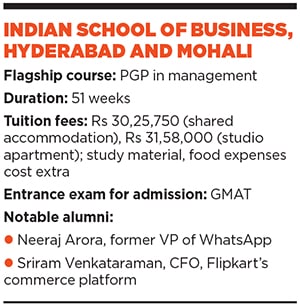
How ISB is helping new-age managers identify the right questions
ISB is reorienting its approach to help new-age managers identify the right questions
Yashodhara Basu Thakur was a go-getting senior business analyst at digital video recorder maker TiVo, with over a decade of Silicon Valley experience, including stints at Apple and Hitachi. When she had a baby, her husband and she decided to return to India early this year. Back home, Basu Thakur had her mind set on becoming an entrepreneur and wanted to get an MBA from a premier institute. The Indian School of Business’s (ISB) global appeal and a shorter, 51-week course was an obvious choice.
For Khushrav Daver, who had joined the foods business of ITC Ltd after a bachelor’s degree in commerce, ISB’s focus on experienced professionals was an added benefit. “It helps me meet and interact with people from various walks of life, who have relevant work experience, and I knew that coming here would mean I could learn from my peers, apart from the faculty,” says Daver, who joined the programme after a four-year stint at the FMCG major.
Business schools such as the ISB are helping build a new generation of managers who are willing to shun the IIT-IIM-America route and take risky entrepreneurial journeys in the country to solve problems that were hitherto under the radar. Rajendra Srivastava, dean of ISB, keynoting a workshop at the school, says, “The biggest mistake we make in schools, in business schools, and in industry is the focus on getting people to learn how to solve problems. We don’t teach them how to find a problem worth solving.”
Later that day, speaking to Forbes India, Srivastava says, “I borrowed that phrase ‘problem finding’ from a conversation with Vishal [Sikka, Infosys CEO].” It’s a phrase, he adds, that elegantly captures the crux of what B-schools have to equip their students with. “You can do 50 things better, [but] finding that one thing that is worth doing, finding a problem that is worth solving is the real contribution of an entrepreneur.”

ISB has formal collaborations with the governments of Andhra Pradesh and Telangana on technology entrepreneurship, reaching about 1,200 engineering students in 20 regional institutions. It also has several international affiliations to leading B-schools: Kellogg, Wharton, London Business School, MIT Sloan and Fletcher School are its founding associate schools.
Some of the important focus areas of the school include research on business model innovation, strategies to take it global and ways to aid social innovation. The school has a department of science and technology-approved incubation centre and it works with mentorship networks such as TiE (The Indus Entrepreneurs).
ISB also has a Centre for Innovation and Entrepreneurship, and is in the process of setting up an i-Club, or an innovation club, that will comprise venture capitalists, angel funders, lawyers and so on. “An ambitious plan is to develop global partners,” Srivastava says.
Says Deepa Mani, an associate professor at the school and joint director of ISB’s Srini Raju Centre for IT and the Networked Economy, “Research is a big part of the school, because the content that we take into the classes is based on the research that we do.”
The Srini Raju Centre is focussed on ICT-centric research and outreach. And it has just released the first of a six-part series leading to a specialisation in ‘Business Technology Management’, in collaboration with the online learning site Coursera.
Instead of looking at tech as hardware, software, networks and so on, one pitches forward to “see new products, new processes, new business models”. “That ability to look at technology through the lens of business is a skill that is seriously lacking. This specialisation is a response to that,” adds Mani.
In addition to the 240-acre wooded campus on the outskirts of Hyderabad, ISB has a second campus in Mohali and it’s common for some lectures to be delivered from one to another through “telepresence,” says Satish Krithivasan Iyer, ISB’s chief technology officer. Small tweaks—like better positioned cameras and large projector screens that ensure the lecturer looks directly at both sets of students—have enriched the classroom experience of this exercise.
The school also uses the option of “flipped classes” where students can find lessons online in advance and the actual class is devoted to a more interaction-oriented exercise and impromptu quizzes.
“When ISB was first conceived, there was an acute shortage of top-level management education in India. And to get into some of the institutes was extremely difficult,” says Adi Godrej, chairman of the Godrej Group as well as ISB’s governing board. “So we decided to have a world-class institute in India.”
ISB was also the first to start a one-year programme that packed in learning hours equivalent to conventional two-year MBAs, Godrej points out. And that the school insists on work experience and its strong research orientation makes it stand out, he says.
“We have a vast executive education programme, which we think is necessary and ISB has been extremely successful,” Godrej adds. “It costs much less to pursue a world-class MBA degree from an institution like ISB in India, than going and living abroad. That is also one of the reasons why ISB is so successful, along with the excellent placement record that it has.”
ISB’s students also rate it high on everyday necessities and comforts. On-campus family accommodation, for instance. This is a big deal for Basu Thakur, as her husband and nursery-going son get to stay with her. The school also offered support in agreeing to extend her admission acceptance status by a year, so that she could get more time to wrap things up in the US before the move back to India.
(With additional reporting by Aveek Datta)
(This story appears in the 30 November, -0001 issue of Forbes India. To visit our Archives, click here.)






